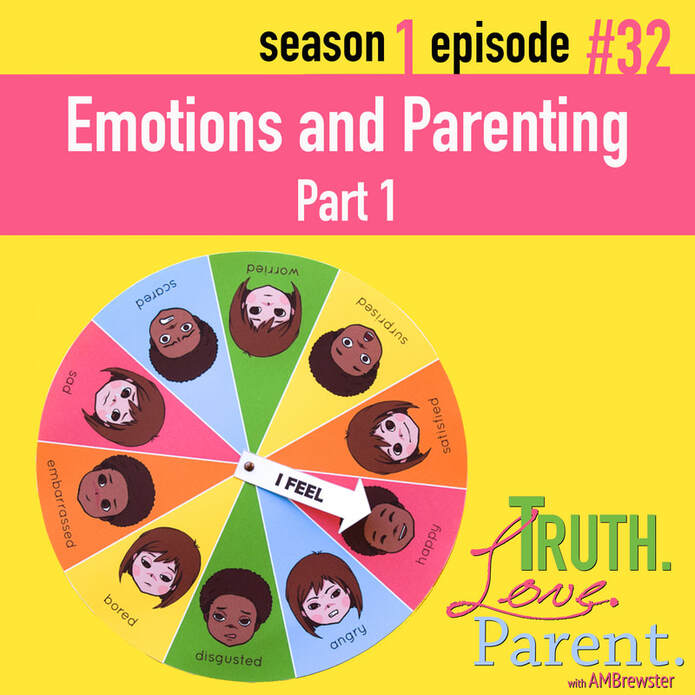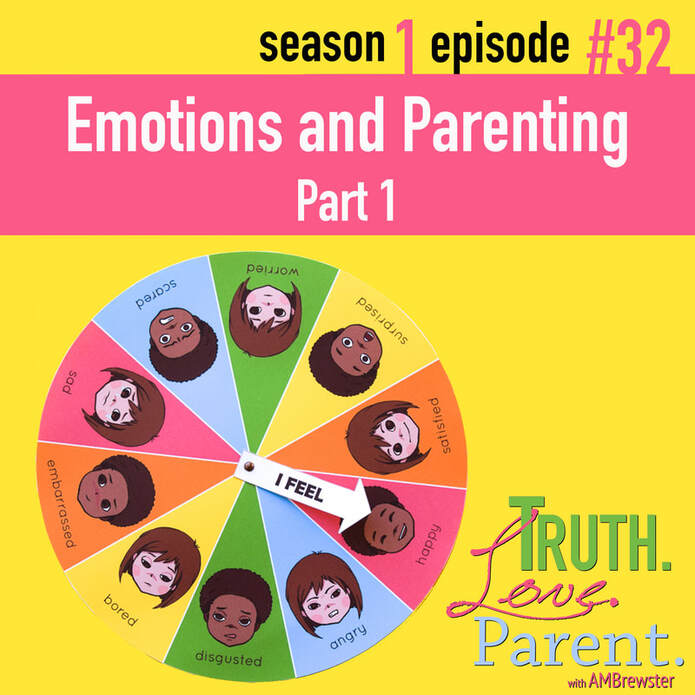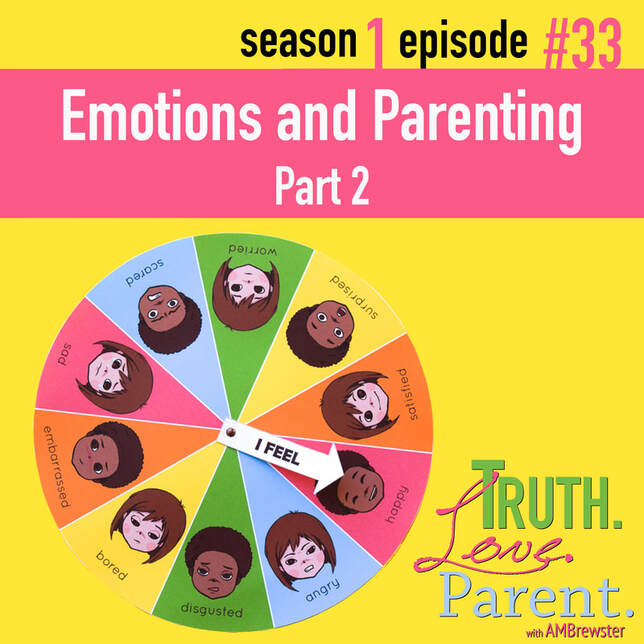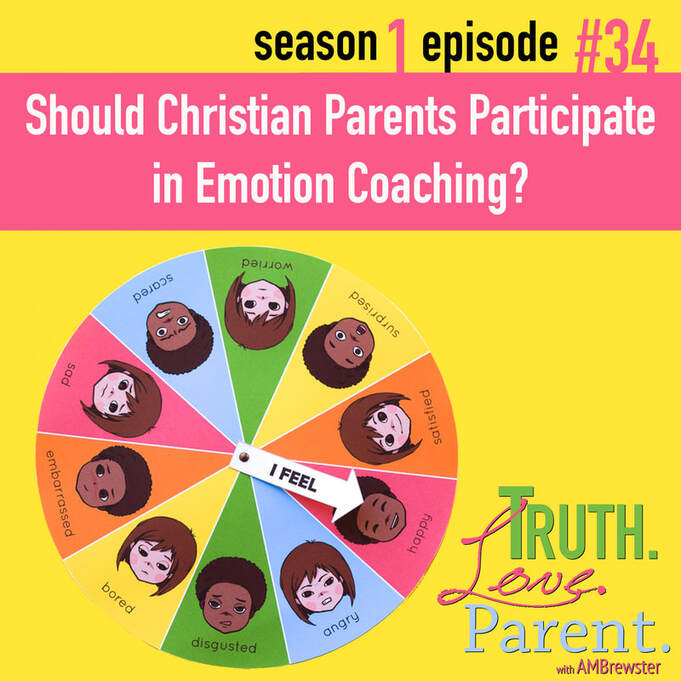
It is so easy to parent our children emotionally. We yell, we cry, we panic, we overreact. But none of it is helpful. Today we begin a study to see why God gave us emotions and what role they play in our parenting.
Inside Out trailer Check out 5 Ways to Support TLP. Click here for our free Parenting Course! Like us on Facebook. Follow us on Instagram. Follow us on Twitter. Follow AMBrewster on Twitter. Pin us on Pinterest. Subscribe to us on YouTube. Need some help? Write to us at [email protected]. Click "Read More" for today’s Episode Notes and Transcript. Emotions and Parenting, Part 1
|
||||||||||||
Episode Notes
| Episode 32 Notes.pdf | |
| File Size: | 888 kb |
| File Type: | |
Transcript
Introduction
Less than Obvious Observation: I love old-school Pixar (before the sold out to Disney and started preaching all their deviant beliefs about sexuality). Seriously, they are seemingly the only massive movie company dedicated to producing genuinely wholesome, family-friendly content. Much of their work even conforms to God’s revealed truth. But this does not stop me from having some serious issues their movie, Inside Out. If you haven’t already seen the movie, I might encourage you to watch the trailer I’ve linked below.
That one scene beautifully illustrates many of the most deadly misconceptions about emotions all tied up with a tragic bow of sex-stereotypes, served with some death-of-a-family fruitcake.
Overall, I really did enjoy the movie, but the main theme is the stuff of Failure, and we cannot hope to glorify God in our parenting if our emotions are Inside Out.
Please, understand that this is not a review of the movie. Yes, I liked it. Yes my family and I have watched it more than once. But, we do so with a firm understanding that we cannot believe the Failure Philosophy the movie teaches.
But more on that in a minute.
We are honored to -- once again -- share with you a review of our podcast. Matt-Steven wrote this, “I’ve been looking for a resource like this for years and finally found it. I am a pastor and cannot wait to share this phenomenal resource with the parents of our church. I am so thankful that this podcast is not moralistic but instead gospel centered. Thank you.”
All I can say is, praise the Lord. Without His Word to guide us, I would be just another talking head cluttering the internet. God’s Word gives us purpose and the power to accomplish it in our parenting.
If TLP has blessed you, will you consider searching for our show on iTunes and rating us? Rating and reviewing helps more people find us. We also encourage you to Subscribe and Share each episode with your friends.
We also hope that our Episode PDF’s may be a beneficial resource. They can be found at TakingBackTheFamily.com.
And, now let’s get emotional.
Topic
But is that good enough? Does that make the message of the movie biblical?
Our society cannot bear the weight of more emotional misinformation. What we really need is just the opposite . . . or we’ll continue destroying our families with popcorn-stained fingers.
Part I
I’d like to start our discussion with the observation that God is the one Who’s given our families the gift of emotions. I say this first to diffuse any potential criticisms that “you’re just an unemotional robot/Vulcan/rock” or “you hate emotions.”
That’s patently untrue. I am not a robot . . .
or a Vulcan,
or a rock.
I am an incredibly emotional guy (proved dramatically by the fact that Pixar hasn’t made a movie yet that doesn’t make me cry). I love emotions . . . just like I love cars. However, I try my best to understand the purpose and place of emotions in life lest I hurt myself or the people I love. Just like cars.
But even as I say that emotions are a gift from God, I need to point out Firstly, that the Bible doesn’t use the word “emotions” or “feelings” like we do. It often refers to emotions using pictures that ancient cultures would understand. The “heart” and the “bowels” are two examples. However, not every use of these organs refers to our emotions. Still, one of the best examples that emotions are from God is that He makes time for them.
Ecclesiastes 3:4 says, “A time to weep, and a time to laugh.”
Both of these actions (neither of which are emotions, by the way) are purely motivated by what we feel, and God has scheduled those times of high emotion into our lives.
But we must observe secondly that most of the direct commands concerning specific emotions are in the negative. Here are just a few token examples:
“Be anxious for nothing.” Philippians 4:6
“A hot-tempered man stirs up strife.” Proverbs 15:18
“Do not be frightened.” Joshua 1:9
What do we take from this? Well, just like a gun-safety class, most of the information you learn is what not to do with the gun, followed secondly by how to carefully do the right thing with the gun. Why? Because guns are dangerous! Warnings never accompany innocuous things (unless, of course, you’re an American businessman who doesn’t want to be sued).
In the same way, emotions can be so destructive that God spends more time talking about their dangers than their merits.
Secondly, I want to look at God’s Design for Emotions
Did you know that feelings are not desires. They’re not thoughts. They’re not beliefs or behaviors. They’re not decisions. Feelings may play into any and all of those things, but they’re a unique creature.
Most psychologists agree that an emotional response requires three things:
- an external experience,
- an internal physiological response,
- and an external behavior.
But at their basic core, emotions are simply chemical reactions to stimuli. They’re an “internal physiological response.” Chemicals. Hormones.
The two things that are similar with all emotional responses are that they are powerful, but they are also equally subjective.
- Powerful – I don’t believe any evidence concerning the strength of emotions in needed. They’ve been blamed for everything from passionate love to wholesale murder.
- Subjective – This point is harder to make because we only know our own reaction to emotions. Still, the research is there. Let me illustrate it this way: a boy in your son’s class has been called on to present his oral report. Immediately his body becomes tingly and his appendages start shaking. His voice waivers and his sweat glands burst forth. He’s a wreck, and everyone can see it. Some time after the speech he divulges to your son that he was petrified. However, your son - who signed up for Speech class that semester - was also asked to give his report in the same class. Immediately, he feels the same rush pour over his body. However, he learned in Speech that what he was feeling was a God-given adrenaline response to high-stress situations. He knew that he could allow it to control him or that he could use the tool God gave him to deliver a better speech. So, instead of freaking out, your son focuses on using that extra energy to make his gestures more powerful, his voice more authoritative, and his inflection more interesting. When he gets home he tells you that giving the speech was “a rush” and that he really “enjoyed it.”
Same situation, same chemical response, two very different “feelings.”
Why was there a difference in the two boys’ perceived emotional response? Well, what they knew and believed about the chemical reaction dictated how they responded to it. What’s interesting, is that other students would likely have no intense chemical response to this situation at all!
People are fond of saying, “You can’t control your emotions.” But that’s a lie!
If I placed two pieces of cake in front of you – one was a dried up piece of boxed white cake with a famine of crusty frosting and the other was a moist, delicious slice of chocolate perfection made from scratch, you would likely be very happy about eating the chocolate cake . . . until I told you I poisoned it.
Now, what just happened to your emotions? That depends. Do you believe me? If you believe me to be like Captain Hook –- so detestable as to endanger a person’s life with a slice of rich, moist cake –- then you are no longer excited about eating it. In fact, you’re disgusted and potentially afraid of the cake. However, if you believe I’m kidding because I’m “just that kind of guy,” you’ll dig in because, hey -– free cake!
The point is, you had direct control over how you felt. From the moment the cake was offered, your mind decided which cake it would be excited about and whether or not to abate that excitement because of something stupid I said. Your belief about the cake, me, and the situation dictated how you felt . . . not the other way around. Your emotions did not dictate what you believed about the situation - unless, of course, you let them.
Thirdly, not only is it important to know God’s design for emotions in general, we need to understand the specific jobs He designed them to do.
God gave us emotions for three main reasons:
The first job God tasked our emotions with is the most enjoyable.
- Emotions make our lives more meaningful. This one’s easy. Praise God for genuine happiness, passion, excitement, and exhilaration! But the second and third responsibilities are the most overlooked.
- Emotions make it easier to accomplish tasks. Like in the example of the oral report, adrenaline is often inappropriately interpreted as fear. It’s also labeled anger, passion, and a panoply of other feelings because it appears in so many high stress situations and is interpreted so many different ways. But in reality, it’s just a tool to help us deal with the situation at hand. You may interpret it as fear or delight as you careen down a roller coaster, but the reason God gave it to you was to help you handle the experience - whether to fly or fight - as it were. And what you believe about the feeling will dictate how you use it.
- Emotions warn us when there’s a spiritual problem. Let’s say I’m doing something, and I feel a rush of adrenaline that leaves me feeling excited and exhilarated. But, let’s say, the stimulus is that I’m having an inappropriate interaction with a girl. Because our world puts so much stock in their emotions, whatever they feel becomes right. If they feel good doing it, it must be okay. But the fact that I’m happy doing something God condemns reveals a much deeper heart problem. It’s just like feeling sad when God wants me feeling glad? If sin makes us happy, we should notice the fact that our emotional response is not lining up with God’s Word . . . and that should concern us enough to seek change.
This is so important, I want to go back to the illustration with the boy and the girl. Here’s what the boy’s emotional response during during the inappropriate physical encounter tells me about his relationship with God.
If he feels only exhilaration and euphoria because he’s getting physical pleasure with no regard to God and His plan, the boy’s relationship with the Lord is very weak. There’s no twinge of guilt or conscience or concern about offending His Lord. This person may either have no relationship with God or be so entrenched in his sin that he’s basically an addict in need of a significant intervention.
If, however, he’s exhilarated at the potential pleasure of his sin, but he’s also feeling guilty for his actions against God, then at least his conscience is working. Thankfully his conscience and -- perhaps -- the Holy Spirit is trying to remind him that this behavior displeases his Lord and is therefore struggling with mixed emotions.
However, the best case scenario is that same boy is approached by the girl who’s instigating wrong physical interaction, and the boy feels sorry for the girl and her poor choices and disgust for the suggestion that he find his pleasure in a behavior which displeases his Lord because -- like Joseph -- he thinks “how can I do this great wickedness and sin against God.”
In each of those scenarios, the boy’s emotional response was guided by what he believed to be true in the situation. Not the other way around.
This is where the movie Inside Out is lying to us. It would have us believe that all of our reactions to life are motivated by various emotional responses -- not what we believe. This is akin to saying that an employer is managed by his employees. It may work that way in some businesses on the brink of failure, but that’s not how it’s supposed to work. We get hurt and we hurt others when we allow our emotions to do a job God never created them to do.
Emotions are a response to stimuli. They’re a reaction. They may make it easier to enjoy, accomplish, and interpret events . . . but not dictate them.
Inside Out is painting a world where emotions are responsible for making decisions. Those seemingly capricious chemical responses are given the reigns of every word, thought, decision, desire, action, and belief! Talk about the cart before the horse! That’s why the character of Riley ends up running away. And though it was her emotions that escorted her back home, that’s a scary scenario! What if Joy and Sadness had been beaten down by Fear and Anger? What if Disgust for her parents vetoed Joy’s pleas for the “good old days”?
When emotions are allowed to dictate the beliefs that are supposed to be influencing the emotions, we enter a spiraling vortex of death-by-emotion.
This truth is actually lived out in our favorite TV odd-balls: Sherlock, Monk, Lucy, or House. What do you have? People who allow their chemical responses (or lack thereof) to determine what’s right in the world. Monk, the 90’s detective for hire who suffered from every imaginable disorder and phobia the medical community’s ever invented, solved murders and complex crimes, but he couldn’t put two and two together to see that milk wasn’t going to kill him?! He was afraid of milk. Why? Evidence? No! Emotion was allowed to make the decision. And emotion is not too smart, folks.
This example isn’t mere fantasy either. Real people struggle with similar emotional addictions all over the world. You and your children, likely, have your own favorite flavor of emotional addiction. Maybe it’s an irrational fear of spiders. Perhaps you hate being told you’re wrong . . . even when you are. Others of us love our sinful pleasures so much that even though God says they’ll destroy us, we foolishly roll around in the vomit of our sin.
For me, I struggle with anger, but that anger is very often rooted in fear. When my kids disobey, The Dictator Parent in my isn’t so much angry at being disobeyed, I’m generally more afraid of what this disobedience will breed in my children if left unchecked, and that fear tempts me to control the situation, and anger is a great tool to scare people back onto the right behavioral track. But all of that was sin because it denied so many Truths about God, sin, the gospel, parenting, and love.
Conclusion
AND IF PIXAR IS RIGHT ABOUT EMOTIONS AT THE HELM OF OUR DECISIONS, WE’RE IN TROUBLE!!
The five emotions in the movie were Joy, Sadness, Anger, Disgust, and Fear. Are you kidding me? You’re telling me that my life is ruled 4/5ths of the time by emotions I don’t even like?! This list was taken directly from Paul Eckman’s research in the 1970’s (minus his later addition of Surprise). Of course, years later he expanded his list to include many other emotions such as amusement, embarrassment, and pride. Needless to say, Eckman’s model isn’t the only one out there.
But when our families buy into misinformation like this, it makes the Bible seem ludicrous when It commands “count it all joy when you fall into diverse temptations.” How is poor little Joy supposed to overcome Anger, Disgust, Fear, and Sadness all the time?
Failure Philosophies like this make it normal to see a family dissolve in a mere 2 minutes and 10 seconds.
Thank you for joining me today. Next time on Part 2 of this discussion we’re going to take a scene from the move -- one which all too well portrays some of our family’s daily conflicts -- and we’ll pick it apart to see how it lines up with Scripture, and then investigate how the foundation of the family is being dynamited away, and how to rectify it in our homes.
As always, please join TLP on Facebook and me on Twitter @AMBrewster.
Listen, the world wants us to believe that we should parent our children with our feelings. But God offers us the divine hope that we can be Ambassador Parents, parenting out of love for Him, and in His power. That is what I invite you to embrace this week in your home.
Until next time, be the 5th Parent.
|
|
|
|
Leave a Reply.
Receive Updates
Subscribe to Our Podcast
Categories
All
Abortion
Addiction
Adoption
Apologetic Parenting
Attractions
Authority
Bad Parenting
Celebration Of God
Christian Parenting 101
Church
Communication
Counseling
Culture
Daily Life
Devotional
Discipleship
Discipline
Education
Emotions
Entertainment
Evangelism Parenting
Failure Philosophies
Family Devotions
Favoritism
Foster Care
Friendship
Guest
Guest Author
Holidays
Homeschool
Influence
Interviews
Love
Marriage
Obedience
Parental Responsibility
Parenting Difficult Children
Parenting Q&A
Parent Your Kids Through . . .
Peaceful Parenting
Personality
Premeditated Parenting
Questions
Quotes
Racism
Resources
Sanctified Sustainability
Sexuality
Spiritual Warfare
Teach Your Child To _____
Technology
The 5th Parent
TLP News & Info
Wisdom
Worship
Archives
July 2024
June 2024
May 2024
April 2024
March 2024
February 2024
March 2023
February 2023
January 2023
September 2022
August 2022
July 2022
June 2022
May 2022
April 2022
March 2022
February 2022
January 2022
December 2021
November 2021
October 2021
September 2021
August 2021
July 2021
June 2021
May 2021
April 2021
March 2021
February 2021
January 2021
December 2020
November 2020
October 2020
September 2020
August 2020
July 2020
June 2020
May 2020
April 2020
March 2020
February 2020
January 2020
December 2019
November 2019
October 2019
September 2019
August 2019
July 2019
June 2019
May 2019
April 2019
March 2019
February 2019
January 2019
December 2018
November 2018
October 2018
September 2018
August 2018
July 2018
June 2018
May 2018
April 2018
March 2018
February 2018
January 2018
December 2017
November 2017
October 2017
September 2017
August 2017
July 2017
June 2017
May 2017
April 2017
March 2017
February 2017
January 2017
December 2016
November 2016
October 2016
September 2016











 RSS Feed
RSS Feed
